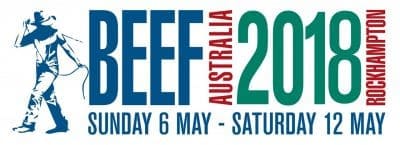
GENETICS and genetic technologies will feature prominently at the industry’s premier Beef Australia 2018 event in Rockhampton next month.
From farm tours, to seminars, to the event’s dedicated ‘genetics supermarket’ featured as part of the trade exhibition, genetics will be front and centre during the week-long activity.
Among the hundreds of commercial trade displays, the Durack pavilion will become a veritable genetics ‘one-stop-shop’ for visitors, featuring 40 exhibitors including breed societies and individual studs, artificial breeding services, genetic and genomic testing providers, semen sales and genetics exporters, stud herd management software providers, semen testing providers and professional services like the Australian Cattle Veterinarians and BreedPlan.
The trade fair sites will be open from Monday to Friday, 7-11 May from 8.30am to 5pm.
Click here to access genetics expo exhibitors.
Seminars
Among the 46 seminars planned over five days during Beef 2018 will be a number carrying strong genetics and artificial breeding program management content.
On Monday, 7 May, Boehringer Ingelheim will host a seminar titled Improving commercial beef production through Fixed-time AI.
Fixed-time AI allows AI to be performed without the need for heat detection. The use of FTAI programs in a beef herd can increase the weaning weight of calves, by tightening the calving pattern, and bringing it forward to earlier in the season. Of course, it also allows the genetic improvement of a herd by the use of bulls with known genetic data. These benefits have seen an increase in the number of female cattle involved in FTAI programs in Argentina from 4.5pc in 2013 to 12pc in 2017.
The same trend can be observed in countries such as Brazil, Paraguay and Uruguay. The purpose of the seminar is to present FTAI experiences and examples in beef production systems to show the feasibility of implementing these programs under different Australian management conditions. The audience will also learn about a recent FTAI trial in Queensland in 500 Brahman cross heifers, reviewing the results and practical implications, and the net benefits that FTAI can deliver to the reproductive performance of the herd.
Presenters include:
- Reproduction expert Dr Lucas Cutaia from Argentina, who started teaching and researching activities in bovine reproduction at the Institute of Animal Reproduction of Córdoba (IRAC), with Dr. Gabriel Bó. In 2012 he became Global Technical Manager with Syntex, working across more than 25 countries providing technical training for distributors and customers.
- Dr Liz Pryor, who has been a cattle vet for nearly 15 years, working in both Australia and New Zealand, and is currently Field Services Veterinarian for Boehringer Ingelheim Animal Health Australia. Liz’s interests include improving profitability through health management, nutrition and reproduction.
On Tuesday, 8 May, a precision breeding seminar will be held, hosted by Repro360.
Fixed-time Artificial Insemination (FTAI) has been regarded as the most useful method to disseminate the desirable genetics in beef herds and has been widely applied, with a continuous growth of numbers of animals involved in these programs in South America within the last 20 years. Most of the FTAI treatments for beef cattle are based on the use of progesterone releasing devices and oestradiol or GnRH, with a mean pregnancy per AI ranging from 40 to 60pc. The main advantage of using these protocols is that it can be successfully applied in maiden heifers and suckled cows in anoestrus, reducing the postpartum interval and tightening the breeding season.
Modern FTAI programs have changed the paradigm significantly, both negating the need for heat detection and allowing 100pc submission rates. The result is reasonable conception rates over large groups of animals resulting in enviable pregnancy rates to proven bulls.
Speakers will include Dr Enoch Bergman from Swans Veterinary Services in Esperance, WA, who will walk participants through his successful integration of FTAI into a high proportion of his client’s beef cattle enterprises. By mating his client’s heifers, via FTAI, to high accuracy, curve bending, calving ease, high growth bulls, he has been able to reduce their calving interval, reduce their calving issues, retain heifers with superior genetics out of their heifers, and wean heavier calves, ostensibly setting their heifers up for life.
Dr Gabriel Bo will speak on practical use of embryo transfer technology in beef herds; donor and recipient selection and management. Dr Bó, is currently President and Director of Research and Post-graduate training of the Instituto de Reproducción Animal Córdoba (IRAC) and Professor of Obstetrics and Biotechnology of Reproduction at the Veterinary School of the Instituto de Ciencias Basicas y Aplicadas, Universidad Nacional de Villa Maria in Cordoba, Argentina. Dr. Bó has been working for many years on applied research and the commercial application of fixed-time Artificial Insemination and Bovine Embryo Technologies.
Central Queensland Wagyu cattle producer Darren Hamblin will speak on utilising reproductive technologies for carcase value. The Hamblins run a 6000 head Wagyu Fullblood and crossbred beef operation in Central and Southern Queensland. Mr Hamblin will explain how they utilise AI, FTAI, MOET & IVF technologies to join 3500 females annually. These artificial breeding systems are traditionally used on small scales in stud operations, but this unique operation successfully breeds commercial animals on a large scale using artificial breeding to produce high value Wagyu beef.
Where: Gallagher Livestock Manager Room (James Lawrence Pavillion) When: Tuesday, 8 May, 2-4.30pm
Farm tours
A feature of Beef Australia 2018 are the Westpac-sponsored property tours which include half-day or one-day tours to 11 beef properties in Central Queensland over the five days. Several of these tours will demonstrate the application of genetic technologies to breeding programs.
Platinum tours will involve small groups flying to and from the property and travel to the remainder of the full day and half-day tours will be by coach. Tours may be booked out so it is important to book ahead on the Beef 2018 website.
Kaiuroo Station: Monday May 7 (Platinum Tour)
Kaiuroo Station is an amalgamation of five neighbouring properties nestled next to the MacKenzie River, which runs registered Grey and Red Brahman herds. It is managed by Jennifer McCamley and Tom Emmery of Ag Resource Management. Jennifer and Tom will showcase their innovative approach, which combines the best practical procedures with the very latest science in Brahman seedstock.

Kaiuroo operates under Certified Organic production principles
They will present how profitability in their commercial herd has defined their objectives, and reveal how they have used a genotyping program to describe the genetic merits of animals in the seedstock herds
The Kaiuroo registered herd is currently involved in a MLA Donor Company (MDC) funded project. The project aims to measure phenotypes for male and female reproductive performance as a part of the Brahman Breedplan analysis of their seedstock herd.
Dr David Johnston and Dr Matt Wolcott from Animal Genetics & Breeding Unit will present the MDC project objectives, early outcomes, and the latest developments in the genetic evaluation for tropical beef breeds on the tour. Paul Williams from Tropical Beef Technology Services will demonstrate ovarian scanning as well as presenting key updates from the Brahman Beef Information Nucleus (BIN) project.
Mt Elsa: Monday May 7
Totalling 3885ha, Mt Elsa consists of sandy loam river country, pondage pastures, irrigation and forest country. Located in the Yaamba district Mt Elsa is owned and operated by Steven & Claire Farmer.
Mt Elsa has been involved in the Smart Futures Fund Next Gen Beef Breeding Strategies Project, the Northern Genomics Project, and supplied bulls for the MLA-funded “Repronomics” and MLA Donor Company funded Northern Beef BIN projects.
Mt Elsa is European Union (EU) accredited and consists of 250 stud Droughtmaster females. These females are supported by a commercial Droughtmaster herd comprised of 400 cows that are mated to Wagyu bulls for F1 production.
There will be some excellent speakers onsite including Ben Hayes, from UQ, who will be discussing optimising genetics through objective selection and genomics. Additionally, Ross Newman will be providing key information on the value of irrigated pastures and the benefits of Wagyu production, including the use of breeding and backgrounding first-cross Wagyu cattle through innovation and technology transfer.
Barfield Station: Monday May 7
This full-day tour will take participants to Banana where they will be able to take a first-hand look at Barfield Station, owned and operated by Robert and Melinee Leather.
The Leathers run an organic Brahman based herd with 500 breeders. Robert and Melinee use a parallel production system to run their business in conjunction with their other property Four Mile. Planned crossbreeding has played a major role in the Leathers breeding program. They have crossed Limousin bulls with their Brahman cows to increase retail beef yield in the progeny. Currently, they are expanding their herd to include some Belmont Red, Senepol and Brangus bloodlines to increase marbling in their slaughter cattle.
Belmont Research Station: Wednesday May 9
Belmont Research Station has been the premier research station for the north Australian beef industry for over 60 years. The 3260ha property is located 37km north of Rockhampton on the Fitzroy River.
Technological solutions are Central Queensland University’s Precision Livestock Management team’s specialty. Technologies in use at Belmont include walk-over-weighing systems connected to auto drafters and vision recognition technology.
Telemetry is used to monitor water troughs, GPS collars to track animal behaviour, virtual fencing, accelerometers, proximity loggers, on-site data processing, and low-band, mobile and satellite communications infrastructure. The systems are being tested and enhanced with a view to integrating a wide range of systems into simple, practical solutions that can drive improved herd management and profitability.
Data from these technologies is analysed as part of research activities with insights presented via CQ University’s DataMuster app – a fast, simple and accurate tool for monitoring herd performance right down to the individual animal.
Additionally, participants will tour the neighbouring Beef Breeding Services laboratory and see first-hand their artificial reproduction capabilities.
Rowanlee Cattle Station: Friday 11 May (Platinum Tour)
Rowanlea is a 6885ha property situated 40km southwest of Calliope and is run as a partnership of Bruce, Helen, Andrew and Kate Chapman.
Rowanlea is a mixture of creek flats and undulating hills which run into steep ranges where the Chapmans usually maintain around 2500 head of cattle. The herd consists of Santa Gertrudis and Brahman breeders including a Santa Gertrudis stud which is intensively performance recorded.
Chapmans have been proactively involved with research and development programs, and are currently involved in the MLA funded “Repronomics” and Northern BIN steer projects.
With a balance of improved pasture development and management, animal data recording and processing, and practical management, the Chapmans aim to meet their breeding objectives of producing cattle on a coastal environment to meet the EU and Grasslands markets.
